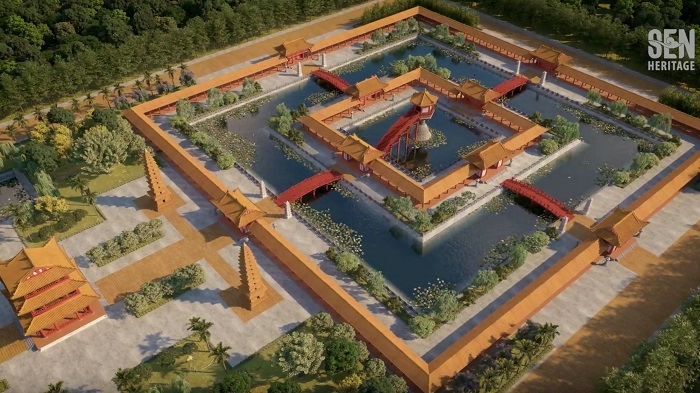
The Ministry of Culture, Sports and Tourism has recently approved a project on building a national brand on cultural tourism from the end of 2020. Cultural tourism can be considered a basic tourist product in Vietnam. However, in order to position and raise the brand, there is still much work to be done, especially in the context that the tourism industry is being heavily affected by the COVID-19 epidemic.
The Ministry of Culture, Sports and Tourism has recently approved a project on building a national brand on cultural tourism from the end of 2020. Cultural tourism can be considered a basic tourist product in Vietnam. However, in order to position and raise the brand, there is still much work to be done, especially in the context that the tourism industry is being heavily affected by the COVID-19 epidemic.
 |
| An overview of the One Pillar Pagoda reconstructed using virtual reality technology. |
Cultural tourism has become an outstanding strength and is quite well exploited in some localities. Many localities have considered heritage as a core to develop areas such as ecotourism, spiritual tourism, experience tourism, etc.
However, in reality, there are still many problems. Most localities only focus on promoting strengths from natural and tangible heritage. Meanwhile, there are a lot of intangible areas they have not exploited in an effective manner.
The World Bank once reported that Vietnam's tourism has reached a tipping point in development, causing the degradation of cultural and natural tourism assets as well as the support of local communities for toursim.
Tourism in Vietnam, as well as many countries around the world, is being heavily affected by the COVID-19 pandemic. Enhancing the brand for cultural tourism is necessary and must be planned from now on so that it can be implemented immediately when the epidemic ends.
According to Deputy Director General of the Vietnam National Administration of Tourism Ha Van Sieu, in order to exploit the potential of heritage towards building a national tourism brand, localities need to develop a long-term plan and strategy in re-planning the heritage system and must associate traditional cultural values with tourism development planning.
Digital technology has and is being applied in almost all areas of social life. The field of heritage is no exception, the digitisation of heritage is also a “key” to elevate the brand of cultural tourism.
In Vietnam, typical examples of technology application in heritage are: the 3D digitisation works of Tien Le communal house (Hoai Duc district, Hanoi), the Van Mieu - Quoc Tu Giam (Temple of Literature), and the Opera House in Hanoi. Some works of the complex of relics in Hue ancient imperial city (Thua Thien Hue province) have also been applied 3D technology such as: Tu Duc Tomb, An Dinh Palace, and Long Van Khe Hoi painting (Dieu De Temple).
At the end of 2020, the Sen Heritage group also organised an exhibition themed "Discovering the architectural heritage of the One Pillar – Dien Huu Pagoda from the Ly Dynasty through VR technology". The VR3D Dien Huu pagoda project helps viewers go back 800 years to walk around the royal pagoda during the Ly Dynasty. The main product of the project – the virtual reconstruction of Dien Huu Monastery Platform and its One Pillar Structure in 1105 – helps the Vietnamese generations of the 21st century experience this feudal beauty with both VR and AR technology.
Most recently, the Centre for Scientific and Cultural Activities of the Temple of Literature has applied QR code technology (two-dimensional barcodes) on 40 artifacts, trees and construction items on the relic site. Accordingly, visitors only need to use a smartphone, place a signboard with a QR code installed in front, and the system will automatically log in and transfer to the visitor's cellphone basic information about that artifact.
These are all new experiments, bringing vivid experiences and highly appreciated by visitors. Deputy Director of the Centre for Cultural Heritage Research and Promotion Nguyen Van Huy highly appreciates the effectiveness that digital technology brings to heritage conservation, thereby promoting the development of the Vietnamese cultural tourism brand.
Unfortunately, the application of technology in the field of heritage has not been replicated and lacks synchronous implementation. Most are only research hypotheses or topics. Therefore, it is necessary to further accelerate the digitisation of heritage, build high-quality tourism products, thereby raising the brand of Vietnamese cultural tourism.
(Source:Nhan Dan)





